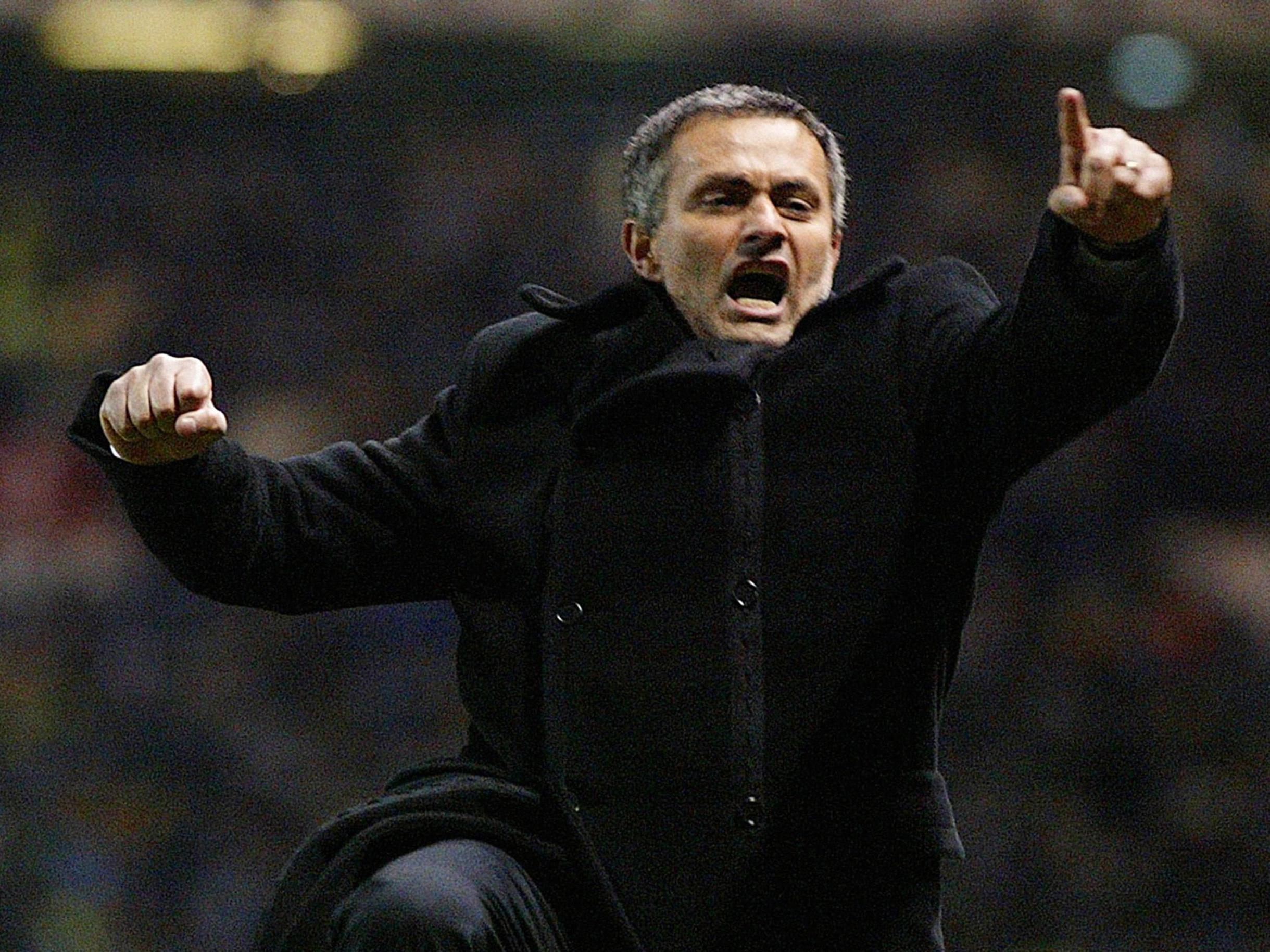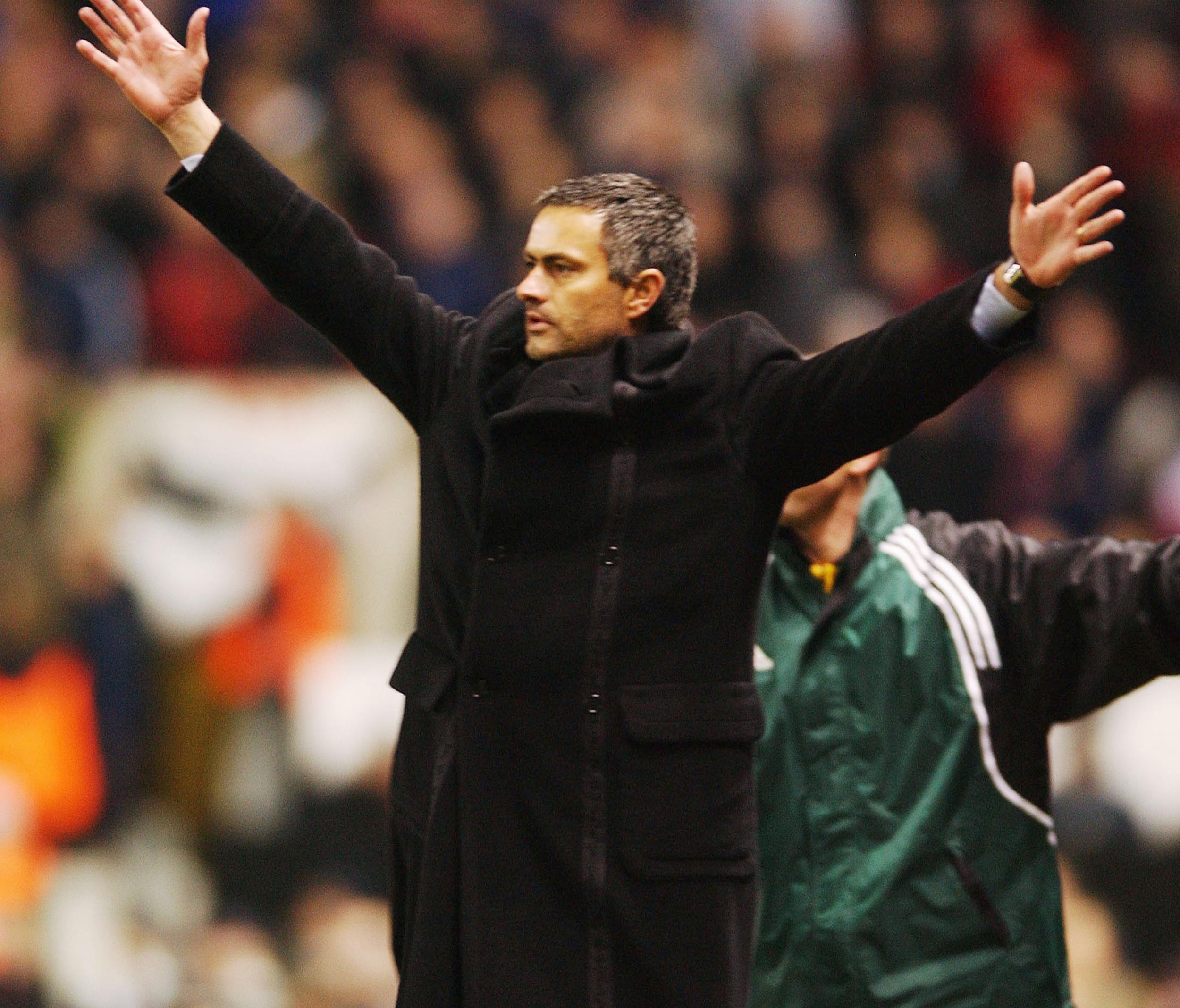Remember when... Jose Mourinho ran down the Old Trafford touchline as Porto beat Manchester United
In our series celebrating small but seismic moments in sporting history, Lawrence Ostlere remembers the Champions League tie which gave British fans their first glimpse of the jaw-dropping arrogance of Mourinho

Half an hour after a raucous first leg had ended, Jose Mourinho gave what remains one of his most memorable post-match sermons, an early artefact of the great phenomenon we would come to know as Mourinho Shithousery.
The build-up to United’s 2003-04 Champions League tie against Porto had been filled with tension. Ferguson was under pressure after a series of difficulties on and off the pitch, from the sale of David Beckham to Real Madrid and Rio Ferdinand’s nine-month ban for a missed drugs test to signing Eric Djemba-Djemba. He put huge significance on the two round-of-16 games, resting players in the Premier League with dire consequences in an effort to patch an injury-ravaged side together to face the Primeira Liga and Uefa Cup champions, who under their charismatic coach had not lost a game all season.
Initially Jose Mourinho seemed like most other managers to face Ferguson and United, two great institutions of British football. Mourinho was hugely respectful leading up to the tie, almost to the point of reverence, but in hindsight his overflowing graciousness was something more calculated, a way of taking pressure off the shoulders of his players, many of whom had never played a Champions League knockout tie like this before. Mourinho made sure the conversation was all about United.
Behind every great second leg is a great first leg that time forgot, and on that February night in 2004, the Estádio do Dragão pulsed as one of Europe’s great powers arrived with an unfamiliar sense of vulnerability. Things started well for United when Quinton Fortune scored a crucial away goal pouncing on the rebound of a Paul Scholes free-kick, but Benni McCarthy equalised soon afterwards, and the stadium roared in the final minutes when McCarthy leapt above United’s makeshift centre-back pairing of Gary Neville and Wes Brown to aim a header satisfyingly into the corner of one of those perfectly boxed nets.
The atmosphere in the ground was already febrile, but passions between the two managers ignited only when Roy Keane was sent off moments later for a stamp on goalkeeper Vitor Baia. It was reckless from Keane who could have cleared Baia’s sliding body with a jump and instead thudded some studs on his back, but Ferguson was incensed by the keeper’s theatrical reaction, something he felt embodied a strategy in Porto’s play throughout the game. As the full-time whistle blew Mourinho offered a hand and a sympathetic smile, but it faded as Ferguson grabbed him and barked angrily in his ear.
And so when Mourinho gave his post-match address, the room was rapt.
“Ferguson told me in the tunnel that he thought Vitor had made the most of it. I said I wanted to see it on TV before I made a comment and if he was right, I would apologise. However, if he has no reason to make the claim then he can apologise to me. I understand why he is a bit emotional. He has some of the top players in the world and they should be doing a lot better than that. You would be sad if your team gets as clearly dominated by opponents who have been built on 10 per cent of the budget. We had 21 shots to four. At Old Trafford, we will go there to win again.”
For most British fans, this was their first glimpse of the jaw-dropping arrogance of Mourinho. Most managers spoke about Sir Alex in respectful platitudes, yet here was a young coach with a stoic face and a thick Portuguese accent explaining why Ferguson should feel sad. The baiting off the field and the perceived theatrics of Porto’s players on it got to Ferguson, and yet for most onlookers there was something oddly alluring about this young coach. Mourinho has always been at his charming best when punching up: here he stared down the journalists in front of him with disarming self-assurance and, long after his players had delivered their performance, gave one of his own. Mourinho had made no secret of his desire to manage in the Premier League, and he used the stage to grab English attentions.
In many ways the return leg was the epitome of a Mourinho performance. In the build-up he absorbed Porto’s pressure like a sponge, announcing his starting line-up to the media 24 hours before kick-off and returning to his ploy of hailing the great Manchester United. “It is difficult for me to understand why they are so worried,” he said with a glint in his eye. “Are they afraid because they have to play us and beat us? All they have to do is beat us and we will go home with a smile on our faces. It’s so simple.”
But United were worried, and the pressure was loading on Ferguson to turn around their slump. He brought Djemba-Djemba into midfield for the suspended Keane, and once again things started well when John O’Shea crossed for the arriving Paul Scholes to glance into the far corner. Old Trafford nerves were beginning to settle. With momentum building Scholes thought he’d added a second just before half-time but was wrongly ruled offside. United led 1-0 at half-time, level 2-2 on aggregate and leading on away goals.
But in the second half their nerves grew and United’s shaky defence retreated into their own territory. Mourinho turned to his bench, bringing off the skilful 19-year-old Carlos Alberto and throwing on the giant Lithuanian striker Edgaras Jankauskas, the kind of switch he would repeat years later in the home dugout with Marouane Fellaini. The crowd became anxious as the ball was repeatedly launched forwards, and in the 90th minute a high punt towards Jankauskas drew a foul from a helpless Phil Neville, 25 yards from goal. Whistles around the stadium pierced the air. “It’s now or never for Porto,” said commentator Clive Tyldesley as McCarthy hit the free-kick. Tim Howard flapped at it, Costinha pounced on it, and Mourinho set off down the touchline.
It would be easy to dismiss Mourinho’s charge from the dugout to the corner flag as another attention-seeking show, and undoubtedly there was a little of that in everything he did, but this was more instinctive. Those thick eyebrows popped up over United’s red-brick wall to see the ball spill loose and even before Costinha had scored Mourinho was gone, fists pumping, his long black coat flapping in the wind. The celebration peaked with a leap and a punch of the air before fading into a slow march, both arms raised, utterly triumphant.
There is a great photograph that captures the chaos of the moment Mourinho reached his players. They are celebrating wildly, a pile of blue and white bodies bundled on top of one another, and in the foreground Benni McCarthy is whirling around the corner flag in manic delight while behind him Mourinho is leaning into one of his substitutes for a hug. “Why not celebrate this way?” he later wrote in his book, Mourinho. “This is surely an iconic picture in my career. A 50-metre sprint at Old Trafford. The next day I had two big English clubs knocking on my door. A blue and a red.
“Players, subs, manager, flag! Madness, but madness from our heart.”
There were still a few minutes to cling on and Porto defended for their lives until the sanctuary of full-time. Ambush complete. It was what would become quintessential Mourinho, upsetting the natural order, overturning the odds and putting himself centre stage. Costinha would later joke that Mourinho wouldn’t be the Special One if it wasn’t for his quick instincts, which holds some truth, but the reality was that none of this could have happened without Mourinho. He ran back to the tunnel with his fingers jabbing at the sky in a state of furious delirium, United fans berating him all the way.

As the Porto players celebrated wildly, there was a knock on the dressing room door. It was Ferguson and Neville, his captain. “They told us ‘Congratulations, you deserve it, enjoy it’,” Mourinho later said. “That was something in Portuguese culture I was not used to. It’s something I kept during my career when an opponent does something magnificent against my team. Something from big people to make others feel special.”
Perhaps Ferguson recognised a little of himself in Mourinho. For years he had peddled ‘the establishment vs United’ narrative to galvanise his club in times of difficulty, like the fallout from Cantona’s flying kick or Ferdinand’s ban, and here Mourinho preached a similar line. The reality was that Porto’s players – Deco, Ricardo Carvalho, Maniche – were talented winners while United’s squad was a shadow of its former self, but Mourinho’s rhetoric and reaction helped write the story of a full-scale giant-killing.
Ferguson managed to resurrect United’s season with an FA Cup semi-final win over high-flying Arsenal before going on to win the trophy, but it would be three years until he got his hands on the Premier League title again, in part because of Mourinho. He got his wish to manage in England that summer and quickly set about transforming Chelsea from challengers to champions. Years later, Mourinho would reflect on his touchline gambol with pride. “It was a team of kids coached by a kid,” he said, “realising a dream.”
Join our commenting forum
Join thought-provoking conversations, follow other Independent readers and see their replies
0Comments